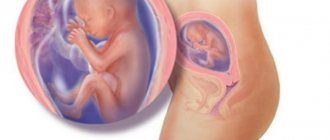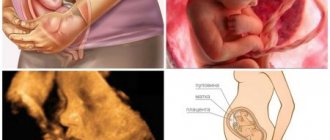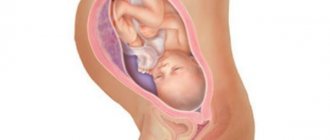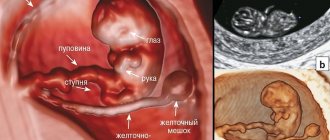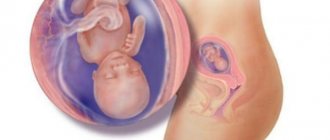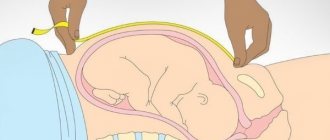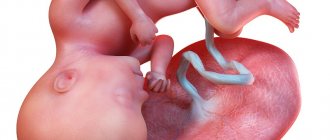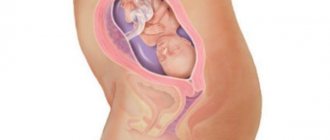Now you have already reached the 11-12 week mark of pregnancy. Is this a lot or a little?
Doctors say that this is the child’s first anniversary. Mom still has the first trimester behind her, which is considered the most painful. In addition, it was accompanied by a high probability of miscarriage, which is now becoming less and less. Now you can please your relatives and friends with the great news about the imminent addition to the family. The golden time of gestation is ahead. Both the physical and moral well-being of the pregnant woman improves, and the new life in the tummy continues to actively grow and develop.
Many people are interested in: 12 weeks of pregnancy – how many months? You and your baby have been side by side for 3 months.
The fetus at this stage: what it looks like, what happens to it
From a small embryo, he becomes more and more like a person. But still very tiny. If you could pick it up, it would fit in the palm of one hand. The body is still in disproportion - the head is much larger than the legs and arms.
But your child can boast of his unique feature - his fingerprints are already fully formed. All layers of the epidermis have formed.
It is important to understand, when you are 12 weeks pregnant, what is happening to the baby:
- legs and arms formed, nails appeared;
- muscles develop and grow, he begins to move a little;
- reacts to external stimuli;
- the nervous system continues to improve;
- future eyebrows and eyelashes appear, but for now in the form of a fluff on the corresponding areas of the face;
- he knows how to wince;
- closes and opens mouth;
- may swallow amniotic fluid;
- the diaphragm begins to move and breathing movements appear.
The fetus begins to write. And his brain was divided into two hemispheres. The face continues to take shape, and the earlobes have acquired their final appearance. But even though the eyelids are already there, they still close the eyes quite tightly. But despite this, the child begins to learn to blink. The size of the fetus at the 12th week of pregnancy is from 5 to 8 centimeters, weight - only 12-16 grams. Some compare it to a lemon.
The threat of infection is reduced since all internal organs have formed and help fight infections. This process is facilitated by the maturation of the thymus gland or the so-called thymus gland. It is she who is responsible for the immune system. The liver produces bile. At 12-13 obstetric weeks, gender differences are not yet visible. To determine the sex of the little one, you need to wait another week or two.
The pituitary gland begins to actively function, which now produces extremely important substances for growth and the establishment of proper metabolism. The circulatory system is fully functioning. There are already leukocytes in the blood. Bones and skeleton of a cartilaginous structure.
The heart beats a steady rhythm of 100-150 beats per minute. Orientation in space is provided by the nascent vestibular apparatus.
There is still enough space in the amniotic sac for free swimming.
Viral respiratory diseases
Colds accompanied by high fever can affect a pregnant woman due to a temporary weakening of the immune system. Complications of acute respiratory infections and acute respiratory viral infections can negatively affect the health of the fetus, cause hypoxia, and spontaneous abortion. You should not self-medicate colds, as some medications are contraindicated during pregnancy.
Possible treatment measures:
- Bed rest, ensuring rest;
- Drink plenty of water - tea, lingonberry and cranberry fruit drinks, currant infusion;
- Treatment of cough with warm milk with honey or Borjomi mineral water;
- Rinse the nose and rinse the mouth with saline solution.
Complications of a cold in the form of a severe cough, high fever, and headaches are treated in a hospital setting.
What happens to the expectant mother: changes in the body and well-being
Sensations at the 12th week of pregnancy enter a favorable phase. Morning sickness is left behind, nausea recedes. Thanks to hormones, women in labor “bloom” before our eyes. Their complexion changes. Hair becomes silky.
But your emotional state still remains unstable: now you can worry about any trifle, or even for no reason. But after 5 minutes you are happy and smiling.
Now is the time to register with a gynecologist. Now you need to visit his office once or twice a month.
Externally, changes in the appearance of the future woman in labor become noticeable to observant people around her. A rounded tummy is outlined. The uterus has already grown by at least 10 cm and, naturally, it does not have enough space. That's why she starts to come forward. Every 7 days she will gain another centimeter. You can still hide your “interesting position” behind spacious outfits. But you should already go shopping and buy special clothes for pregnant women.
Some of the unpleasant features of the situation include:
- Increased stress on the heart, liver and kidneys.
- Heartburn and constipation may still bother you.
- Fatigue sets in.
- There is a lack of fresh air.
- Pigment spots may appear on the skin, but do not worry - they will go away after childbirth. The same applies to the dark stripe on the stomach.
- There is a threat of varicose veins.
All necessary nutrients are supplied to the fetus through the circulatory system, so the increased blood volume causes tachycardia.
The hormone progesterone is now produced by the placenta, and not by the corpus luteum, which is now withering (it was in the place of the mature egg).
What is pleasant for many girls is that the volume of the bust begins to increase. Another positive thing is that the urge to go to the toilet becomes less frequent.
As for weight, some may gain a couple of kilos, while others, on the contrary, lose them. Both are within normal limits.
Discharge. Discharge that is white, milky, or with a yellowish tint is considered normal and not cause for concern. Perhaps they will give off a sour aroma.
Purulent or mucous discharge indicates the presence of candida fungus. Simply put, you have developed thrush, which urgently needs to be cured.
But if you notice bloody spots on your underwear, accompanied by itching, burning, a strong unpleasant odor and even pain in the lower abdomen, this is a serious reason to contact an antenatal clinic.
Pain. In general, nothing should bother a woman. But barely perceptible pain in the lower abdomen is acceptable. The fact is that the ligaments that hold the uterus begin to stretch and create some discomfort.
The lower back may also ache. The belly, which gradually begins to enlarge at the 12th week of pregnancy, shifts the center of gravity and this is reflected precisely in the back. But it can also indicate problems with the bladder, namely inflammation or infection. To save yourself from unnecessary worries, consult a doctor.
Weight of a pregnant woman at 12 weeks
From this stage of pregnancy, stable weight gain begins. Every week your body weight will increase by 0.5 kg. If there was no early toxicosis, when a woman loses some weight due to poor appetite, then before this period a weight gain of 1.5-3.5 kg has already occurred. Too high a rate of gaining kilograms is undesirable, as it is an additional burden for the body, which already has to work “for two”.
A pregnant woman’s body weight increases due to an increase in the weight of the fetus, amniotic fluid, uterus and placenta, mammary gland tissue and subcutaneous fat. To control your figure, you will have to limit frequent “snacks”, change a sedentary lifestyle to feasible physical exercise, and walks in the fresh air.
Necessary tests and ultrasound appointment
Analyzes. It is mandatory to donate blood for biochemical analysis. The list of examinations is updated:
- blood for sugar;
- test for AIDS, syphilis;
- hepatitis B test;
- determination of blood group and Rh factor;
- analysis for the level of hCG (human chorionic gonadotropin);
- coagulogram;
- flora smear;
- sowing tank.
They also monitor mommy: they measure volumes, control weight, measure pressure and temperature.
Ultrasound. It is at this time that it is appointed for the first time. The mother and baby meet for the first time, she sees what her child looks like.
After the procedure, they are sure to give you ultrasound photos, and you can admire them at home and show them to your family.
Even yesterday's embryo from a small dot is increasingly acquiring its usual shape. You can also see subtle vibrations in the chest on the monitor screen - these are your baby’s first attempts to breathe on his own. But for now he is in the womb, and this is just training.
In addition, using ultrasound:
- the uterus is examined, its tone is assessed;
- the location of the placenta is determined;
- the size of the expected replenishment is determined;
- the possibility of pregnancy outside the uterus is excluded/confirmed, etc.
Interpretation of an ultrasound scan at the 12th week of pregnancy makes it possible to determine the presence of congenital defects and chromosomal abnormalities.
The obtained data are compared with standard indicators. This way both the doctor and the parents will know if everything is going according to plan.
What does screening determine at 12 weeks of pregnancy?
A comprehensive study on the pathology of fetal development is carried out in each trimester, and the first of them is at 11-13 weeks of pregnancy. In addition to ultrasound, screening includes a double test - a biochemical blood test:
- Determination of the concentration of free human chorionic gonadotropin;
- Determination of the concentration of PAPP-A (plasma protein A).
During an ultrasound, the parameters of the fetal collar zone are examined - the area of fluid accumulation between the skin tissues. This variable indicator provides informative results only from weeks 11 to 13. The dimensions of the collar zone are different in normal conditions and in the presence of chromosomal abnormalities such as Down syndrome or Edwards syndrome.
Determining an increased amount of hCG in the blood of a pregnant woman will help to timely detect the risk of trisomy 21 (Down syndrome) in the child, and a reduced amount will help to detect the risk of trisomy 18 (Edwards syndrome). The results obtained are not a death sentence; they require confirmation by more accurate tests, for example, an extremely informative study of fetal chorionic villi. A woman with suspected chromosomal abnormalities of the fetus or genetic pathologies must consult a geneticist.
Feel
The 12th week of pregnancy has already arrived, which means that from this moment on, the future mother, if she suffered from toxicosis, will most likely begin to feel better. Yes, yes, the placenta is slowly taking over life-supporting functions, the corpus luteum has “done” its work, and therefore, nausea and vomiting will most likely now be a thing of the past. But, unfortunately, this applies more to “traditional” pregnancy, but if the pregnancy is designated as multiple, the symptoms of toxicosis may remain with it for some time. As well as emotional outbursts, irritability and nervousness caused by hormonal changes in the body.
Even if a woman, due to toxicosis, has lost a little weight in the first weeks of pregnancy, starting from the 12th week, her body weight will begin to increase: plus 500 grams weekly is considered the norm. The new life growing in the womb of a woman requires “the maximum” from the mother’s body, and therefore all its systems and organs work at full capacity. Blood volume increases, its circulation increases, the lungs and kidneys work more actively, the heart beats faster. At the same time, urination is “adjusted” - the frequent urge to go to the toilet “little by little” will no longer bother the woman, as at the beginning of pregnancy. But there may be a problem with bowel movement: the growing uterus puts pressure on it, bowel function slows down, which can lead to constipation.
Diet at 12 weeks
A sufficient amount of fiber in the diet, most of which is consumed raw, in vegetable and fruit salads, will help avoid constipation. The main dishes of a pregnant woman's diet are dairy and lactic acid products, low-fat baked fish or meat. It is advisable to move the main meal to the first half of the day, leaving a light dinner, a fruit afternoon snack and a glass of milk, fermented baked milk or kefir for the night. You should not try to eat “for two” - excess weight will become a burden for the body and create an unwanted load on the cardiovascular system.
